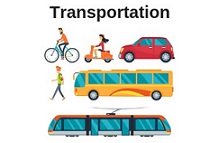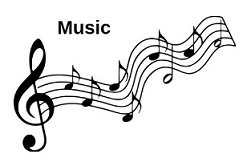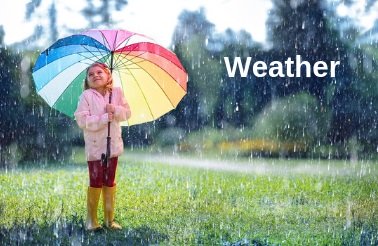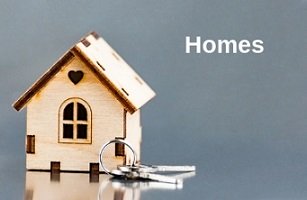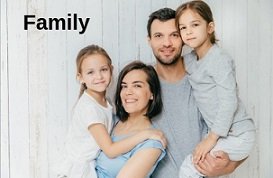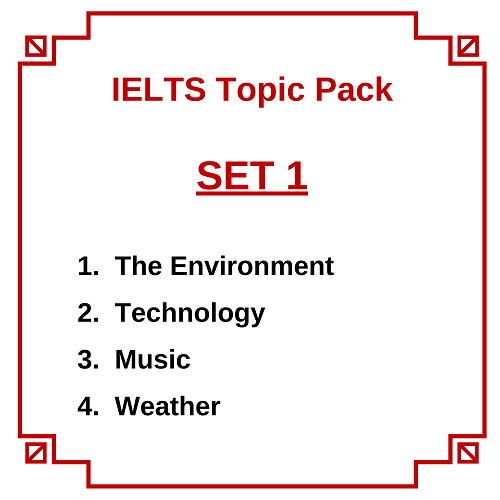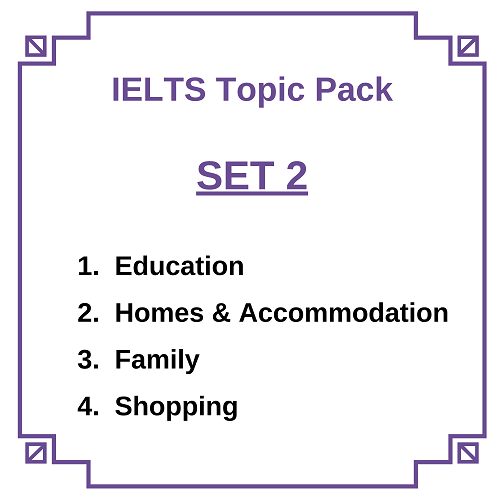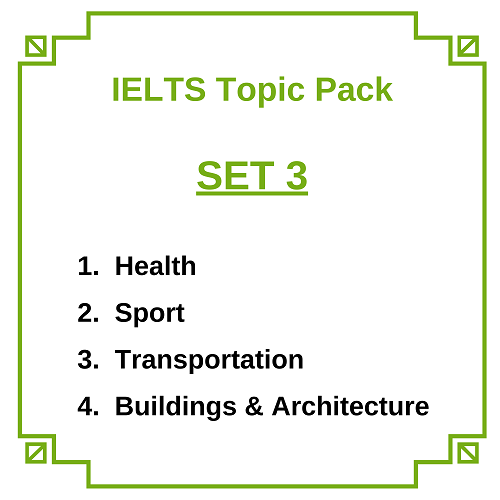Accommodation & Home Vocabulary
Learning
home vocabulary is a must because ‘your home’ is one of the five topics in Part
1 of the IELTS Speaking test that you could be asked about. You may also need
to talk about homes or different types of accommodation in Speaking Parts 2 and
3 and the topic could come up in the Writing, Reading or Listening
sections of the exam as well.
So, let’s make sure you’re well prepared.
Here are a few things you could be asked about:
- What your home is like
- Your favourite room or aspect of your home
- What you’d like to change
- Your ideal home
- Someone else’s home you’ve visited
- The advantages/disadvantages of renting/buying
- Environmentally friendly homes
- Homes of the future
This page includes over 100 common words and phrases related to accommodation and homes. I’ve added an explanation for each one and a sample sentence to show it in context. This will help you to learn how to use it correctly.
Don’t try to learn them all. Look at my suggestions below as to the best way to use this comprehensive list of home vocabulary.
Also check out my Buildings & Architecure Vocabulary page for related words.
 Relaxing at home.
Relaxing at home.To ensure that you’re ready to answer any accommodation or home-related questions, I’ve included four things here:
- IELTS-style questions on the topic of homes
- Sample answers
- A list of common home vocabulary with definitions & sample sentences
- Links to online reading and listening resources
You’ll find PDF downloads of
both the questions and sample answers and the accommodation and home vocabulary
list at the bottom of the respective sections.
The questions relate to the Speaking test because this part of the exam offers the broadest range of possible questions on this topic. They give the best opportunity for me to demonstrate the vocabulary and for you to practise using it.
I’ve included IELTS-style questions and answers for all three parts of the Speaking test. I've highlighted keywords and phrases in bold.
You'll find these words and phrases, and many others, in the vocabulary list beneath. The list also includes explanations and sample sentences and there’s an audio to listen to the pronunciation.
The home vocabulary list contains words and phrases relevant to all parts of the IELTS exam.
Finally, at the bottom of the page, I've added links to topical articles, short videos and podcasts that will help you to improve both your accommodation and home vocabulary and your reading and listening skills.
IELTS-Style
Speaking Test Questions and Answers
Common accommodation and home vocabulary is highlighted in bold.
Part 1
1) What kind of property do you live in?
My home is a semi-detached bungalow.
2) How long have you lived there?
I moved in on my 21st birthday and I'm nearly 25 now so I've been there for almost four years.
3) Do you plan to live there for a long time?
Buying and selling a house is very stressful and I said that I would never do it again after last time. Besides, I love my home so think I will stay there forever.
4) Is there anything about your house you would like to change?
Not really. I have thought about doing a loft conversion to give me another bedroom for when friends come to stay but that’s all.
5) What's the difference between where you live now and your last home?
I used to live in an apartment by the sea. It had a wonderful view but no garden. Now I have a large lawn surrounded by a high hedge, and a patio where I like to sit in the sun. I’m very happy to have a garden again.
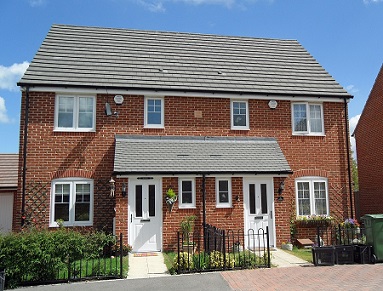 Semi-detached houses.
Semi-detached houses.Part 2
Describe a home you have
visited that you really liked.
You should say:
- where it was
- whose house or apartment it was
- what it was
like
and explain why you liked it.
A few years ago I saw a photo in the window of an estate agent of a fabulous property in a village quite near to where I live. It was my idea of a dream home so I just had to have a look around it. I felt a bit bad about doing this as I knew I couldn’t afford the house. I’ve never done anything like it before, or since.
The house itself was quite modern. It had three bedrooms, separate kitchen and dining rooms and a spacious lounge. It was mostly carpeted and the large windows let in plenty of natural light. There was also a utility room and a double garage. It was actually a fairly ordinary house but would have made a lovely home and it certainly felt cosy.
All the windows had wonderful views over the surrounding countryside which is something I would make a priority if I was house-hunting for real. The owners said that they often saw deer out on the hillsides.
All this was very nice, but I haven’t told you about the best part of the property yet, the garden. That’s what had attracted me in the photo. It was amazing and exactly what I would love to own. For a start, it was huge. There was a large area of lawn, several pretty flower beds and a terrace sheltered by a fence. Even better than that was the stream running through the garden into a big pond with ducks on it. I wish I had that in my garden. You crossed the stream via a little wooden bridge that led to a small field that was also part of the property. It was perfect.
The location of the house was also ideal. It was down a small lane on the outskirts of the village. I know the village well and it’s a close-knit community, something else that would be important to me if I was thinking of moving house. While the area is beautiful countryside, the beach is only 15 minutes away so it has the best of both worlds.
I’m glad I visited the property. One day I’ll buy a home like it but for now, I’ll just keep dreaming.
 Many people's idea of a dream home is a modern house by the ocean.
Many people's idea of a dream home is a modern house by the ocean.Part 3
1) What are the advantages of living in a house compared to an apartment?
I’d say that the biggest advantage is that you don’t have people living above and below you as you do in a flat. Noisy neighbours can be a real problem if you live in an apartment block.
Secondly, most apartments don’t have a garden, although some do have a communal outdoor that all the residents share. That was what I missed most when I lived in a block of flats. It was the main reason I decided to move to a house.
Finally, a house feels more like a home of your own, even if you rent it, as you aren’t sharing any part of the building with other people.
2) Do you think that everyone would like to live in a larger home?
Certainly not. In my opinion, it’s mainly people with young families who want a more spacious home. As their family grows, they like to have a separate bedroom for each child and more than one bathroom. Because it’s so expensive to buy and sell a property, many people add an extension rather than buying a larger house.
Once the children have left home, many parents downsize as they no longer need so many rooms. They often use the money they make from buying a smaller property to help their children get a mortgage and buy a home of their own.
Also, many retired people move from a two-storey house to a bungalow so they don’t have any stairs to climb as they get older. Modern bungalows are cosy and cheap to heat so there’s a saving on utility bills as well. This is important when you’re living on a pension.
In conclusion, although many of us would like a nicer home, I don’t think size is the most important thing for a lot of people.
3) What do you think living spaces will be like in the future?
That’s not something I’ve ever thought about but I would guess that more people will live in high-rises because some places in the world are running out of space for building new houses.
I saw a programme on TV recently where someone had designed a small apartment where the furniture folded away so you could quickly change the same space from a living room to a dining room and then into a bedroom. The kitchen appliances were hidden in cupboards so were shut away until you needed to use them. It was amazing and I think this sort of accommodation could become common in the future.
However, in places with more land available I don’t think there will be much change in the near future. Perhaps in fifty years, people will be living in space but I can’t imagine what their accommodation would look like.
 Cities like Hong Kong have many high-rise apartments as there is very little space to build accommodation.
Cities like Hong Kong have many high-rise apartments as there is very little space to build accommodation.Click this link to get a PDF download of these practise questions & sample answers.
Accommodation & Home Vocabulary
* Important
- Do not try and learn this list of accommodation and home vocabulary.
- Identify the vocabulary you find useful for answering practise questions about this topic.
- Record these in your vocabulary notebook and practise using them regularly.
I recommend that you create
your own answers to the Speaking questions on this page. You will find many
other IELTS-style practise questions by searching online.
For help on how to learn
vocabulary, what to learn and how to record it, visit these pages:
How to Learn Vocabulary for IELTS
Top 6 Types of IELTS Vocabulary & Topic Word Lists
Accommodation & Home Vocabulary – Common Words & Phrases
Home Vocabulary Set 1: Key definitions
house – building where people (usually one family) live
- Our house is near the park.
home – place where someone lives, where they feel they belong
- It’s nice to come home in the evening and spend time with my family.
accommodation – a building or set of rooms where someone lives or stays
- Oti started looking for accommodation as soon as her university place was confirmed.
a property – building and the land it is built on
- Our present house is too small now that we have children so we are looking for a new property.
single storey – with only a ground floor level
- My elderly parents are buying a single storey house as they find it difficult to climb the stairs.
two-storey – with two floors levels
- Sanjay found a lovely two-storey property to rent close to his workplace.
Home Vocabulary Pronunciation
Home Vocabulary Set 2: Types of home
detached house – a house that is not connected to any other houses
- We’d love to buy one of the new detached houses being built near the lake but they’re out of our price range.
semi-detached house – a house that is joined to another house on one side
- Meena lived in a semi-detached house and could sometimes hear her neighbours arguing through the adjoining wall.
terraced house (UK) / row house (US) – a house in a row of similar houses joined together on both sides
- Having a property either side of us means that our terraced house stays warm in winter.
townhouse – a house built in a row but larger in size than a terraced house, often having more than two storeys
- Townhouses are popular with families as they often have extra bedrooms in the attic.
bungalow – a house with only one storey; built all on one level
- Many people move to a bungalow when they retire so they don’t have to climb the stair as they get older.
cottage – a small house, usually located in the countryside
- For lots of people, a cottage in the countryside is their idea of a dream home.
flat / apartment – a set of rooms for living in that are part of a larger building and are usually all on one floor
- It was a big day when their son left home and moved into his own flat.
fully-furnished flat / apartment – one that you rent with furniture already in it
- The young couple didn’t have much money so looked for a fully-furnished apartment to rent when they got married.
studio flat / apartment – a small flat that has one main room for living, eating and sleeping in
- Hilda had the choice of three studio flats in the converted property and chose the one with pink walls.
Home Vocabulary Pronunciation
bedsit – a rented room that has a bed, table, chairs, and somewhere to cook in it but a shared bathroom
- The bedsit is small but has everything I need to create a little home for myself.
condominium (condo) – a building or complex of buildings containing a number of individually owned apartments or houses
- Manuel decided that if he got the big promotion, he would buy a condo down by the river.
apartment block / high-rise – an apartment building with at least 10 floors
- There is little space for housing in my city and most people live in a high-rise.
block of flats / tower block – a tall building with flats on many levels
- They are clearing some of the old terraced houses in our town and replacing them with blocks of flats.
penthouse – an expensive flat at the top of a tall building in a fashionable area of a city
mansion – a large, impressive house
- If we were rich, I would buy a penthouse in London overlooking the River Thames but my husband would prefer a mansion on the coast.
villa – a large, often luxurious house in the country or near the sea, especially in southern Europe, and often rented out for holidays
- We stayed in a fabulous villa when we visited Greece. It even had its own swimming pool.
student digs – student accommodation, often in a shared house
- I was apprehensive about moving into student digs but I’m enjoying it and get on well with my housemates.
hall of residence – a college or university building where students live in flats
- Shishka lived in a hall of residence for her first year at university then rented a house with some friends.
Home Vocabulary Pronunciation
Home Vocabulary Set 3: Location
residential area – area in which most of the buildings are houses
- Our town is growing rapidly with several new residential areas currently being developed.
suburb – a residential area on the edge of towns or cities
- Nearly all my colleagues at work live in the suburbs and commute by train each day.
on the outskirts – the areas that form the outer edge of a town, city or village, that are furthest away from the centre
- It’s great living on the outskirts. It’s easy to get into the city but we are also close to the countryside.
downtown – near the centre of a town or city, especially the business or shopping areas
- I’m looking for a flat downtown so I don’t have to commute far to work.
housing estate – a large group of houses built at the same time and in the same style
- In the UK, most new homes are built on housing estates.
within walking distance – not very far; close enough to reach by walking
- We chose to live here because it’s within walking distance of the school.
close-knit community – a neighbourhood where people are helpful and supportive
- This is a close-knit community and there’s always someone to turn to if you need help.
to live on campus – to live on the university or college grounds
- I like living on campus as I don’t have far to go to lectures or the student’s union bar.
Home Vocabulary Pronunciation
Home Vocabulary Set 4: Rooms
bedroom – room used for sleeping in
- I’ve painted my bedroom yellow as it makes me feel cheerful when I wake up.
living room / lounge / sitting room – room used for relaxing
- In the evenings I chill out in the living room with a book or watch a bit of TV.
bathroom – room with a bath and/or shower and often a toilet
- With five people in my family, we have to queue for the bathroom in the morning.
kitchen – room where food is prepared and cooked, and sometimes eaten
- The kitchen is my favourite room in the house because I love cooking.
dining room – room in which meals are eaten
- I usually eat my breakfast in the kitchen but we always have family meals in the dining room.
study – a room for doing paperwork and studying in
- Kamal spent all day in the study working on his essay.
hall / hallway – open area inside the main entrance which leads to other rooms and usually the stairs
- Having a large hallway is so useful if you have a baby as there’s plenty of space to store the buggy.
landing – area at the top of the stairs
- I’m always telling the kids off for leaving their toys on the landing in case someone trips over them and falls down the stairs.
utility room – room used for storage and equipment such as the washing machine, freezer, etc.
- It’s a rule in our house that all muddy boots are left in the utility room.
basement / cellar – room below ground level used for storage and sometimes for accommodation
- The children are so excited that our new house has a basement as we’ve promised to turn it into a playroom for them.
porch – a covered shelter protecting the front entrance of a building
- I’m so grateful for the porch on a wet day when I have to stop and wipe the dog’s feet before going indoors.
conservatory – a room with a glass roof and walls, attached to a house at one side
- It was Klaus and Meena’s dream to build a conservatory on the side of their house as somewhere to relax in the sun.
attic / loft – space in the roof used for storage and often converted into accommodation
- Margit regretted putting so much junk up in the attic now that she had to clear it out ready for the builders to start work on the loft conversion.
pantry / larder – small, cold room used for storing food
- We had a proper larder when I was young but nowadays, most people keep food in the fridge, freezer or a cupboard.
balcony – a platform enclosed by a wall or bars on the outside of a building, with access from an upper-floor window or door
- My dream home would have a balcony overlooking the sea.
Home Vocabulary Pronunciation
Home Vocabulary Set 5: Owning and renting
to rent – to pay money to the owner of a property to be allowed to live there
- One day I hope to own my own home but for now, I can only afford to rent.
to rent out / let out – to allow someone to live in your property for a fee
- I inherited my mum’s bungalow when she died and I’ve decided to rent it out.
rented accommodation – a property for which a person pays a fixed amount to live in it to the person who owns it
- Being a university town, Exeter has lots of rented accommodation for the students.
landlord / landlady – the owner of a building or room that is rented out to others
- I have an excellent landlord who always fixes things quickly when something needs repairing.
tenant – someone who rents a flat or house from the person who owns it
- The people renting Adil’s flat gave notice last week so he’s looking for new tenants.
to give notice – to inform someone that you will be leaving or that they are required to leave
- We gave the landlord the required 30-day’s notice that we would be moving out of the flat.
to put down a deposit – to make an initial payment as part of a rental agreement or to secure a purchase
- The landlord said that once we’d put down the deposit of £200, the flat was ours.
lease – the contract a tenant signs when renting a property
- We gave him the £200 deposit immediately and agreed that we’d visit the office later to sign the lease.
short-term rental / lease – a rental agreement that lasts for a short time, usually 3 - 6 months
- The flat was only available on a short-term lease as the landlord wanted to sell it.
evict – to force tenants to leave a property if they fail to pay the rent or they behave unacceptably
- The tenants in the flat above us used to play loud music all night long but thankfully the landlady evicted them.
fully-furnished – a rented property with all furniture included
- As a student, I didn’t have any money to buy furniture so always rented fully-furnished accommodation.
Home Vocabulary Pronunciation
estate agent (UK) / real estate agent (US) – someone whose job it is to help people buy and sell property. Some deal with rentals as well.
- Tuyen told the estate agent what sort of property she was looking for and he gave her the details of ten houses she might be interested in looking at.
to get on the property ladder – to buy a low priced property with the aim of buying another bigger or more expensive one later in life
- They were fed up with paying high rents and longed to get on the property ladder and invest in a home of their own.
mortgage – a large loan given to buys a house or flat
- Julio was delighted when his mortgage application was accepted and he could go ahead with his house purchase.
to take out a mortgage – to borrow money from the bank in order to buy a house
- Taking out a mortgage is a big commitment and most homeowners spend all their working life paying it off.
first-time buyer – someone buying a property for the first time
- The developer converted the old house into four apartments that would be affordable to first-time buyers.
repossess – to take back possession of something, especially a property when mortgage payments have not been made
- Luther lost his job and couldn’t pay his mortgage so the bank repossessed it.
Home Vocabulary Pronunciation
Home Vocabulary Set 6: Inside a home
(all the) mod cons – appliances in the home that make it easy to do jobs like washing, cooking, cleaning, etc.
- The furnished apartment I’m interested in renting has all the mod cons, including a dishwasher and tumble drier which many rentals don’t have.
appliances – a device, machine or piece of equipment, especially an electrical one, that does a specific job in the home, such as a cooker or washing machine
- It must have been such hard work for my grandmother running a home without all the time-saving appliances we have today.
fitted kitchen – a kitchen with the cupboards and units designed to fit the space exactly and then fixed in place
- My new fitted kitchen has built-in appliances which make so much better use of the space.
built-in wardrobe – a wardrobe that is part of a room and fixed to the wall
- I didn’t need to buy much bedroom furniture for my first flat as it had built-in wardrobes.
carpeted – the floors have carpet on them
- Some people like bare floorboards in their home but I prefer the rooms to be carpeted.
furniture – items in a home that make it comfortable and functional to live in such as chairs, tables, beds, etc.
- Wolfgang and Angelika went to town to choose some furniture for their new extension.
utilities – gas, electricity, water
- On top of the rental fee, they had to pay for the utilities as well.
spacious – having a lot of space inside
- Sally loved her friend’s new home, especially the spacious kitchen.
cosy – giving a feeling of warmth, comfort and relaxation
- Old cottages have really thick walls which makes them cool in summer but cosy in winter.
natural light – light from the sun
- I hate houses that are dark inside and like my home to be full of natural light.
elevator (US) / lift (UK) – a box-like compartment housed in a shaft for raising and lowering people or things to different levels in a building
-Vadim often walked up the stairs to his tenth-floor flat but took the lift if he was carrying shopping.
Home Vocabulary Pronunciation
Home Vocabulary Set 7: Outside a home
garden – area of grass or other vegetation beside a house and belonging to the property
- I would hate to live in a house without a garden as I love to grow my own vegetables.
lawn – an area of grass that is cut short, especially in someone's garden
- Our garden is mostly lawn with some flower borders and a vegetable patch.
backyard – a small space surrounded by walls at the back of a house, usually with a hard surface (US – an enclosed area covered with grass)
- The kids are out playing in the backyard.
terrace / patio – paved area close to the house for relaxing, eating, etc
- In the summer we enjoy relaxing on the patio and often set up the barbeque there.
hedge – a line of bushes or small trees growing close together around a garden or field
The property had a high hedge which gave it good privacy from the neighbours.
fence – a flat upright structure made of wood or wire that surrounds a garden or other area of land
- We had to put up a new fence at the side of the house as the old one blew down in a gale.
shed – small wooden building in a garden usually used for storing garden tools
- I don’t like going into the shed to get tools out as there are large spiders in there.
garage – building intended for storing a car, usually attached to the side of a house
- Most people in the UK use their garage for storage and don’t have room for the car.
Home Vocabulary Pronunciation
Home Vocabulary Set 8: Improving a property
to convert – to change the form of something
- Our plan is to convert the garage into a study.
loft conversion – to turn the loft/attic into living accommodation
- Doing a loft conversion will mean that each of the children will be able to have a bedroom of their own.
to add an extension – to build an extra room onto a house
- Many people add an extension as their family grows rather than buying a larger house.
to redecorate – to paint one or more rooms again or put new wallpaper on the walls
- The colour scheme in their new house was dull and old-fashioned so they redecorated before they moved in.
to do up a property – to repair and update an old property
- Jai couldn’t afford the smart new houses he looked at so he decided to buy an old property and do it up.
to renovate – to restore to a good state of repair
- The property has been empty for several years but we're planning to renovate it and turn it back into a nice home.
to paper the walls – to put up wallpaper
- My friend is a decorator and is going to help me paper the walls in my new flat.
to tile the bathroom – to cover a wall with tiles to make it water resistant
- We’ve nearly finished the new extension and just need to tile the bathroom.
a lick of paint – a small amount of paint; one layer of paint
- There was very little that needed doing before we move into the house but we gave the walls a lick of paint to brighten them up.
Home Vocabulary Pronunciation
Home Vocabulary Set 9: Other vocabulary
dream home – a home you regard as perfect
- My dream home would be a cottage by the sea.
modern – based on up to date styles
- Most modern houses are very similar to look at and have small rooms and not much storage space.
house-hunting – looking for a property to live in
- We’ve been house-hunting for three months but can’t find anything that really suits us.
house-warming party – a party to celebrate moving into a new home
- I’m going to a colleague’s house-warming party on Saturday and can’t wait to look around her new home.
to have a place of your own – to have your own home and not have to share it with anyone else
- I love living at home with my family but I’m 21 now and have a good job so I feel it’s time to find a place of my own.
to move in – to begin to live in a property
- Niko was impressed with the recently renovated hall of residence and couldn’t wait to move in.
to move out – to stop living in a particular place
- Veronica broke up with her boyfriend and moved out of their flat.
downsize – to reduce in size; to buy a smaller house
- Many parents downsize when their children have left home as they don’t need such a large house.
to feel homesick – to feel unhappy because you are away from home and are missing your family, friends, and home very much
- For the first few months at university, Dalia felt very homesick but she began to feel better once she started to make new friends.
there’s no place like home – an expression that means your home is a special place
- I do enjoy travelling the world and visiting amazing places but there’s no place like home.
next door – the property next to yours
- A new family has just moved into the house next door.
a view – what you can see from a particular place
- The thing I remember most about my grandmother’s house was the lovely view of the mountains.
Home Vocabulary Pronunciation
Click this link to get a PDF download of this list of home vocabulary.
Ways to Improve Your Home Vocabulary
One of the best ways to improve your home vocabulary is through reading. Watching topic related YouTube videos and listening to podcasts is also hugely beneficial.
Here are some online resources I recommend.
Accommodation & Home Articles
Rightmove - Renting & other articles
One of the best reading resources is property listings. Google ‘property for sale’ and read property listings on the websites that come up. They’ll contain much of the homes vocabulary we’ve been studying.
TED Talks
I love TED Talks. They are short videos with a powerful message and are generally very interesting. They’re ideal for improving your vocabulary and give valuable listening skills practise.
Search TED Talks - Homes to help you improve your home vocabulary.





